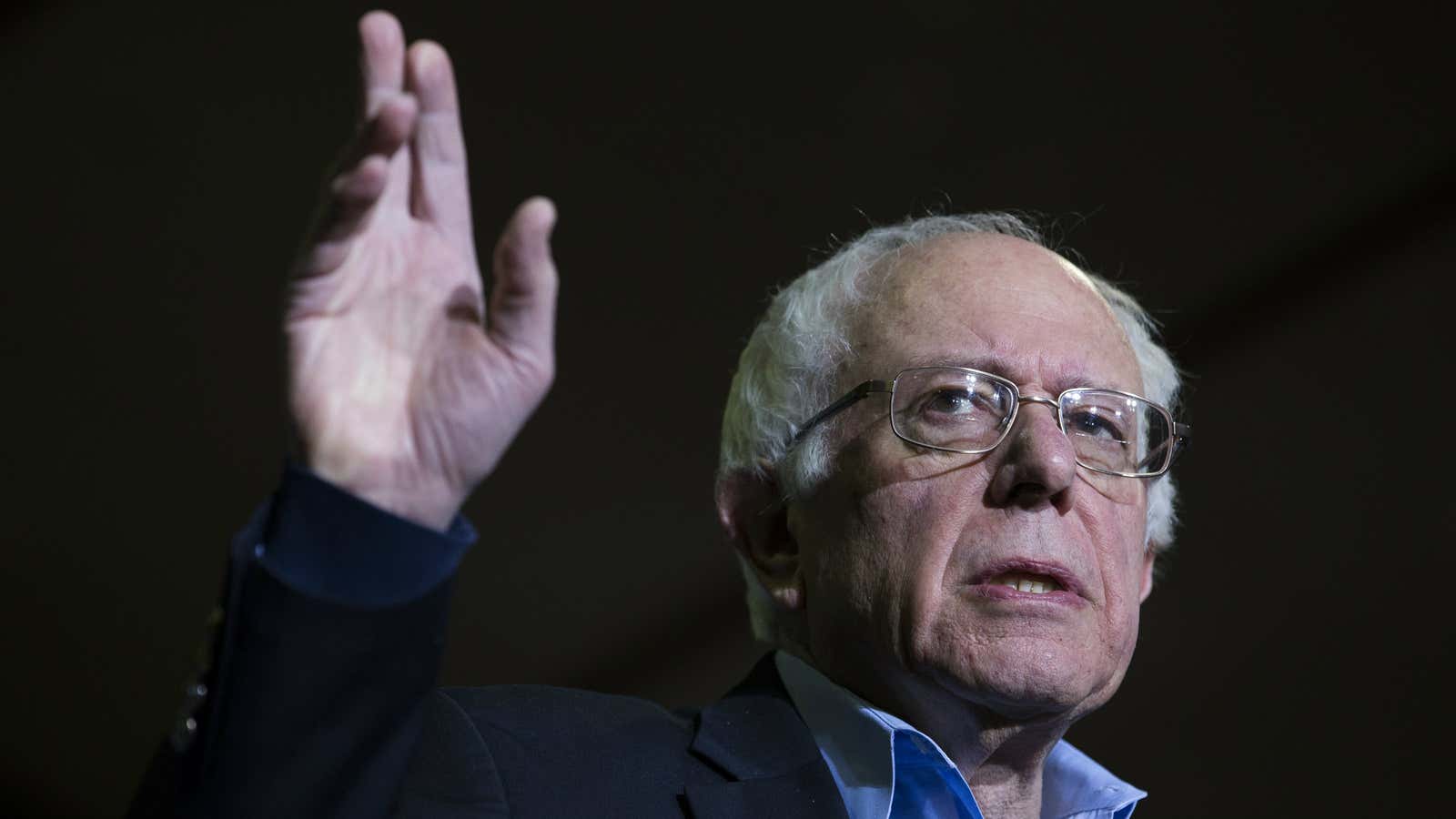Concord, New Hampshire
Senator Bernie Sanders has won the New Hampshire primary by a commanding margin over former Secretary of State Hillary Clinton, based on preliminary results from bellwether precincts. (This post will be updated as a fuller tally becomes available.)
The result was not unexpected: Sanders has led in the state since August. But Sanders’ victory is a substantial one. It will ensure a lengthy battle through primaries in Nevada, South Carolina, and onward, with the insurgent democratic socialist working to push the Democratic party to the left as he tries to claim its presidential nomination.
“We’ve sent a message that will echo from Wall Street to Washington,” Sanders said, introducing a national audience to his stump speech and asking for donations to power his campaign.
Sanders’ victory was set, in part, by demographic trends. The Democratic primary electorate in New Hampshire has grown significantly, fueled by young voters and new migrants to the state, giving Sanders fertile ground for his attacks on economic inequality, special interests, and money in politics.
The battle has grown bitter as the candidates clashed over Clinton’s connections to Wall Street and Sanders’ fundraising on behalf of the Democratic Senate caucus. But Sanders’ supporters were more focused on the economy itself and where president Barack Obama has fallen short, even as they profess admiration for the president and give him credit for the work he was able to accomplish in the face of Republican opposition.
But the deeper divide seems to be over the future of the party, not the past.
Marie Clark, a grandmother of seven who lives in Laconia, New Hampshire, ran a volunteer phone bank turning out Sanders voters on election day. Clark, a former Vermont resident who worked as a property manager, knew Sanders as the senator she could get on the phone to talk about affordable housing.
She had also worked as a foreclosure counselor in Maine as the housing bubble grew, watching as banks gave predatory loans to borrowers for three times their actual income.
“There’s no way you should sign that—people used their equity as a piggy bank,” she said. When the bubble popped, “it really solidified for me what I had suspected for a number of years. As soon as Glass-Steagall was repealed, it opened the floodgates.”
At the Sanders election night rally, Cokie Giles, a nurse from Maine who came with her union to volunteer for Bernie, said she generally agreed with Obama on most issues. But in her home state, where Republican governor Paul LePage declined to expand Medicaid under the Affordable Care Act, she sees sick patients who can’t afford their insurance or sufficient preventative care.
These concerns prey on liberal voters here. According to exit polls of Democratic voters, 40% of the electorate said they were happy with Obama, while 41% say they want a more liberal president.
Clinton’s team is quick to remind that the New Hampshire primary is hardly determinative, or representative of Democrats across the country. Bill Clinton and Obama, after all, each came in second here. Her team is preparing to wage a battle for delegates in the next six weeks of primaries, with the aim of replicating Obama’s steady accumulation of delegates and ultimately seizing the nomination.
The rationale for this scheme depends on Clinton not getting blown out of the water here; it assumes that in friendlier electorates, Clinton will be more competitive if Sanders can’t dominate among white, liberal voters. One election analysts has suggested that Sanders would need more than 63% of New Hampshire’s delegates just to stay even with Clinton.
Those models depend on Clinton maintaining her advantage among Democratic voters that have been less receptive to Sanders’ message—especially black voters. Today, her campaign announced plans for African-American mothers to campaign with her and endorsements from a number of South Carolina state legislators.
But South Carolina’s Democratic primary is weeks away, on February 27. Tonight, New Hampshire is feeling the bern.
